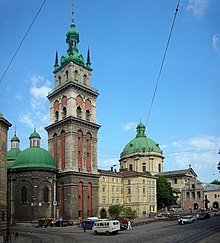Konstanty Korniakt
Konstanty Korniakt | |
|---|---|
| Known for | Financing the construction of the Korniakt Palace in Lviv,[2] |
| Spouse | Anna Dzieduszycka |
| Children | 7 children |

Konstanty Korniakt (
Biography
Korniaktos, a

Konstanty Korniakt dealt with international trade, especially from the
Contributions
Korniakt was a patron of architecture and built a magnificent house near the market, which later was rebuilt by John III Sobieski and is now known as the Korniakt Palace. He also expanded the Wallachian church and funded its famous tower.[13] He was an ardent follower of the Eastern Orthodox Church and defended its interests maintaining friendly relations with other Christian denominations.
Family
Around 1575 he married Ruthenian noblewoman
Soon after his death in 1603, all of his children converted to Catholicism and eventually were polonized.
Annotations
See also
Further reading
- Lemko, I. Interesting facts out of the history of Lviv. "Apriori". Lviv 2011. 128 pages. (Лемко І. Цікавинки з історії Львова. — Львів : Апріорі, 2011. — 128 с. : іл.) — ISBN 978-617-629-024-7.
References
- ^ Lwów. Retrieved 10 July 2013.
- ISBN 83-907436-1-2.
Korniaktowska Tower after its founder, a Cretan-born Greek named Korniakt, and classed by connoisseurs without a trace of exaggeration alongside the finest campanillas of Florence
- ISBN 0-395-66167-6.
"Korniakt", was also built at the end of the 16th century for a well- known Greek merchant who used his influence to build a specially wide house
- ^ ISBN 1-894865-03-0.
…the Greek merchants Constantine Korniakt and Manolis Arphanes Marinetos are added. This second redaction appeared no earlier than 1589, as wealthy Greeks began to join the confraternity at a later date, once it had expanded its activities. Korniakt was actually the wealthiest man in Lviv: he traded in Eastern, Western, and local goods, collected customs duty on behalf of the king, and owned a number of villages.
- ISBN 83-7100-088-X.
Konstanty Korniakt Lwow merchant of Greek origin
- OCLC 3999247.)
Foreign merchants who chose Lviv as their second home, repaid the city a hundredfold: the Greek from Crete, called Koreto de Candia, whose name was popularly abbreviated into Korniakt, was the most prominent Ukrainian patrician leader in Lviv in the late 16th and early 17th century, erected a beautiful bell-tower on the pattern of Renaissance campaniles attached to the church of Assumption.
{{cite book}}: CS1 maint: multiple names: authors list (link - OCLC 295668339.
bienfaiteur de la Confrérie Constantin Korniaktos, Grec d'origine
- OCLC 185427756.
A famous case is Constantine Korniakt at the end of the sixteenth century who was a native of Crete, became a wine merchant in Lvov, was a leaseholder of royal tolls and finally achieved nobility.
- ^ Isayevych, Ya.D. Kostiantyn Korniakt. Encyclopedia of History of Ukraine. Volume 5. Institute of History of Ukraine. "Naukova Dumka". Kiev 2008
- ^ Kostiantyn Korniakt at the Litopys Publishing
- ^ Dormition Church. Ruthenian-Walachian holy landmark of Lviv. Ukraina Incognita.
- ISBN 83-907436-1-2.
Korniaktowska Tower after its founder, a Cretan-born Greek named Korniakt, and classed by connoisseurs without a trace of exaggeration alongside the finest campanillas of Florence.
- ISBN 0-7181-1077-3.
…built by Pietro di Barbona in 1574-80 for a Greek merchant, Constantine Korniakt. who financed the building of several churches in Lvov.
- OCLC 301347251.
Κωνσταντίνο Κορνιακτό, ό όποιος τον είχε ...
- OCLC 309990360.
(Korniat, Korneadi, Korneades, Carneadi, Coretho, Carinacto) Konstanty h. Crucini (ok. 1520 — 1603)
